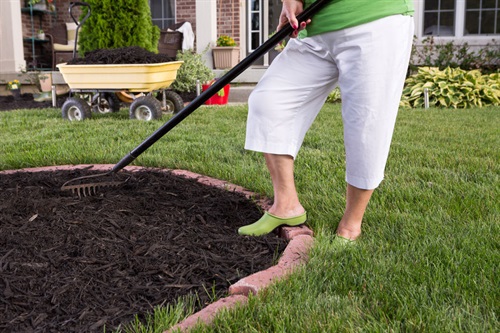Common Mulching Mistakes and How to Fix Them
Whether you’re a commercial landscaper or a home gardener, chances are you’ve probably worked with mulch at some point. While placing mulch for landscaping or gardening may seem like a simple task, it’s anything but. Mulching can be quite the art and, if you don’t know what you’re doing, you could be using it in a way that’s harming your plants instead of helping them.
To make sure you’re mulching correctly, check out these common mulch mishaps and learn how to avoid them:
1. Not using mulch at all.
Mulch offers a lot of benefits you may not be aware of. It helps your soil, and your plants, retain moisture, it keeps plants warm in the winter and cool and the summer, and it can give gardens and landscaping a clean, uniform appearance. Mulch is the best way to protect your plants and cut down on soil erosion.
2. Using too much mulch.
If mulch is so wonderful, it stands to reason that the more you mulch the better off your plants will be, right? Wrong. Too much mulch can cause your soil to become oversaturated, which can drown your plants by suffocating their roots. A good rule of thumb is to keep your mulch layer between two to three inches thick.
3. Not using enough mulch.
Just as too much mulch will cause too much moisture retention, too little mulch could result in your plants’ roots drying out. It may also allow weeds to push through. In short, don’t skimp out on putting the right amount of mulch down!
4. Building mulch volcanos.
While this may sound like a cool-looking way to landscape, mulch volcanoes can be very dangerous to the health of plants and trees. Many people think that a tapered tower of mulch looks nice and, while that may be true, they can also restrict airflow to the trunks of trees and cause them to slowly suffocate and die.

5. Mulching too early.
As soon as the spring sun makes its appearance and the temperature finally begins to rise, gardeners and landscapers start to get excited. While there’s nothing wrong with planning and prepping for planting season, mulching too soon can cause issues down the road. The biggest concern is that applying mulch too early will deprive the soil of the chance to warm up properly. It’s best to wait until middle to late spring to start mulching!
6. Mixing mulch into your soil.
This is a bad idea all around. For starters, it can cause a nutrient balance that can damage your soil and your plants. Mixing mulch and soil can also make it much harder to weed your garden – a task that’s difficult enough in the first place!
7. Not weeding before mulching.
Mulch can certainly smother smaller weeds, but it can’t get rid of larger, well-established weeds all by itself. Weed thoroughly before you lay your mulch down, or you may find yourself having to pick through your mulch to remove weeds later.
8. Using the wrong kind of mulch.
You may think that being offered free mulch from a friend or neighbor is a good score, that is until you learn that it’s full of chemicals that may be harmful to the environment. Treated mulches can harm your plants and your soil for years to come. To protect your garden and soil, it’s best to choose organic mulch which is free of such chemicals.
At American Property Experts, we recycle vegetative debris and other organic materials to create all-natural, 100% recycled mulch. Our bulk mulches, and our bulk soils, are never treated with environmentally unsafe chemicals, making them safe for gardens, children, and animals. Check out what we have to offer at either of our two Wilmington, NC locations at 606 Sunnyvale Drive or 2831 N. Kerr Avenue, or give us a call for more information at 910-793-1460.
